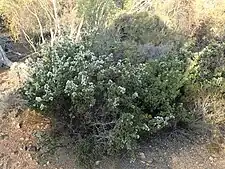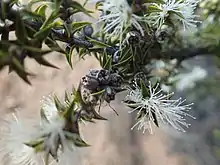Melaleuca cliffortioides
Melaleuca cliffortioides is a plant in the myrtle family, Myrtaceae and is endemic to the south-west of Western Australia. It is a small, prickly shrub very similar to Melaleuca podiocarpa but with fewer stamens in the flowers.

| Melaleuca cliffortioides | |
|---|---|
 | |
| Scientific classification | |
| Kingdom: | Plantae |
| Clade: | Tracheophytes |
| Clade: | Angiosperms |
| Clade: | Eudicots |
| Clade: | Rosids |
| Order: | Myrtales |
| Family: | Myrtaceae |
| Genus: | Melaleuca |
| Species: | M. cliffortioides |
| Binomial name | |
| Melaleuca cliffortioides | |
Description
Melaleuca cliffortioides grows to a height of about 1.6 m (5 ft). Its branchlets are densely covered with soft, fine hairs. The leaves are arranged alternately, 4–9 mm (0.2–0.4 in) long, 1.6–2.5 mm (0.06–0.1 in) wide, narrow oval to egg-shaped, tapering to a sharp point and have many prominent oil glands.[2][3]
The plant flowers profusely but the white or cream-coloured flowers occur singly within the foliage of the shrub and are sweetly scented.[4] The petals are 2.2–2.8 mm (0.087–0.11 in) long and fall off as the flower opens. The stamens are in five bundles around the flower, each bundle containing 8 to 13 stamens. (In Melaleuca podiocarpa there are 30 to 45 stamens per bundle.) The main flowering season is in September and the fruit which follow are woody capsules 4–5 mm (0.16–0.20 in) long.[2][3]
Taxonomy and naming
Melaleuca cliffortioides was first formally described in 1905 by Ludwig Diels in Botanische jahrbucher fur systematik, pflanzengeschichte und pflanzengeographie under the heading Fragmenta Phytographiae Australiae occidentalis:Beitrage zur Kenntnis der Pflanzen Westaustraliens, ihrer Verbreitung und ihrer Lebensverhaltnisse ("Contributions to the knowledge of the plants of West Australia, where they are found and their conditions of existence").[5][6] The specific epithet (cliffortioides) refers to the apparent similarity of this species with a species of Cliffortia.[3] The ending -oides is a Latin suffix meaning "resembling" or "having the form of".[7]
Distribution and habitat
This melaleuca is found from the Ravensthorpe district to the Norseman district[3] in the Coolgardie, Esperance Plains and Mallee biogeographic regions.[8] It grows in sandy on rocky slopes and on undulating plains.[9]
Conservation status
This species is classified as "not threatened" by the Government of Western Australia Department of Parks and Wildlife.[8]
References
- "Melaleuca cliffortioides". Plants of the World Online. Retrieved 27 August 2021.
- Holliday, Ivan (2004). Melaleucas : a field and garden guide (2nd ed.). Frenchs Forest, N.S.W.: Reed New Holland Publishers. p. 220. ISBN 1876334983.
- Brophy, Joseph J.; Craven, Lyndley A.; Doran, John C. (2013). Melaleucas : their botany, essential oils and uses. Canberra: Australian Centre for International Agricultural Research. p. 123. ISBN 9781922137517.
- Corrick, Margaret G.; Fuhrer, Bruce A. (2009). Wildflowers of southern Western Australia (3rd ed.). [Kenthurst, N.S.W.]: Rosenberg Pub. p. 132. ISBN 9781877058844. Retrieved 23 March 2015.
- "Melaleuca cliffortioides". APNI. Retrieved 22 March 2015.
- Diels, Ludwig; Pritzel, Ernst Georg (1905). Botanische jahrbucher fur systematik, pflanzengeschichte und pflanzengeographie. Leipzig. p. 427. Retrieved 22 March 2015.
{{cite book}}: CS1 maint: location missing publisher (link) - Brown, Roland Wilbur (1956). The Composition of Scientific Words. Washington, D.C.: Smithsonian Institution Press. p. 483.
- "Melaleuca cliffortioides". FloraBase. Western Australian Government Department of Biodiversity, Conservation and Attractions.
- Paczkowska, Grazyna; Chapman, Alex R. (2000). The Western Australian flora : a descriptive catalogue. Perth: Wildflower Society of Western Australia. p. 392. ISBN 0646402439.